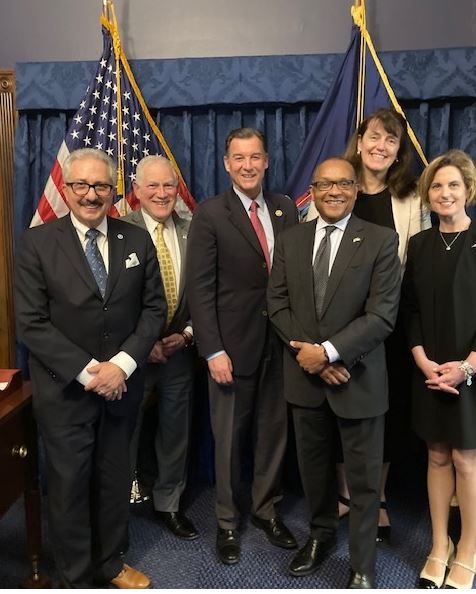President’s Message: The Importance of Embracing and Understanding Advances in Technology
4.13.2023

The precipitous change in technology and its impact on the legal profession brings about opportunities and concerns. While its rapidly evolving pace can be impossible to comprehend, as a legal community we need to be on the forefront of these changes. It is imperative that we educate, provide effective representation and have a voice in how the development of new technology impacts the legal profession.
We need to appreciate the evolving digital landscape as an opportunity for growth.
As former President John F. Kennedy said: “Change is the law of life. And those who look only to the past or present are certain to miss the future.”
The COVID-19 pandemic brought on advances in the use of virtual proceedings and meetings at a pace the legal community was not initially prepared to accept. It also clarified the need for us to have open minds that are willing to learn and adapt while keeping the sanctity of the profession front and center.
The emergence of digital technology, artificial intelligence, ChatGPT and other platforms has the potential to change how we conduct our business and provide client representation. These realities can be intimidating. However, many of these concepts that may seem only theoretical in nature are in fact already part of our everyday lives.
We can address them most efficiently by educating ourselves on the issues, by reaching out to experts inside and outside of the legal profession and by finding ways to incorporate them safely into our daily workflow.
Other technologies such as Web3 and the metaverse also have the potential to bring about a future that we could barely imagine only a decade ago. They can reshape how we practice law because they decentralize ownership of data and digital assets to individuals.
These resources are already impacting the legal profession at an increasingly rapid rate. After all, our clients are using these technologies, creating, accepting and owning cryptocurrency, and operating in the Web3 space. Around the world, businesses and legal communities must be prepared to understand and use Web3 and the technologies it offers.
In addition, these technological advances bring with them a heightened awareness and the need for prudent cybersecurity.
The recent use of facial recognition technology to exclude attorneys who represented clients with lawsuits against Madison Square Garden or who worked for firms that represented these clients took the legal community by surprise. Questions were raised, including the ethics of using this technology in such a manner, its potential chilling effect on the willingness of attorneys to accept cases and the significant impact on access to justice for our communities.
While technology redefines long-standing legal issues and creates many new ones, it is our responsibility to educate, evaluate and suggest how and when the use of technology is appropriate and where we as a legal community and bar associations can benefit from the use of this technology. We must also aim to protect the sanctity of the legal profession.
For instance, advances in AI have left the legal community questioning how it impacts the practice of law.
AI has the propensity to offer illogical recommendations because it generally operates with limited human context and understanding, and it poses risks to confidentiality. AI is also prone to prejudice because its decision-making stems from its programming and data sources. Machine-learning software could thus be developed from a dataset that may underrepresent a particular gender or ethnic group.
Conversely, AI has the potential to narrow the justice gap by providing individuals from low-economic communities greater access to legal resources. It also can streamline law firms’ business operations by automating day-to-day tasks, conducting research in a more efficient manner and affording clients quicker access to documents.
Large language models such as ChatGPT have grown since the tool was made publicly available in November, and GPT-4, which was released in March, improved chatbots’ accuracy although there are still concerns regarding bias and a cloudy regulatory landscape.
As we try to understand the impact of these new technologies on our system of justice and the practice of law, we must come to appreciate the extent of their benefits and their limitations. To do this effectively, it is important to learn to use and navigate these evolving technologies.
At the New York State Bar Association, we formed the Task Force on Emerging Digital Finance and Currency and a Committee on Technology in the Law, which both have been actively presenting CLE programing on issues including Web3 and the metaverse, digital assets, cryptocurrency, cybersecurity, virtual practice of law and digital notarization. We formed the Task Force on the Post Pandemic Future of the Profession and, most recently, the Working Group on Facial Recognition Technology and Access to Legal Representation.
Recognizing that these technologies are here to stay, we must continue to learn about them and test their abilities and limitations. To that end, I decided to ask the ChatGPT Artificial Intelligence Program, which is designed to respond to text-based queries and generate natural language responses, what it believed its limitations were in legal representation. The response was not only appropriate but shows that even AI believes that humans are necessary, at least so far, to the legal profession.
ChatGPT identified four areas of legal representation where it could not replace humans:
One, AI cannot provide the human touch that is essential for legal representation.
Two, AI cannot provide creative solutions to legal problems.
Three, AI is not yet able to process large amounts of data and parse out its relevant portions, which may impact the data’s quality.
Finally, AI cannot provide ethical judgment.
It concluded by acknowledging that AI has limits to what it can provide in legal representation. ChatGPT’s own acknowledgment of its limitations seems to suggest that lawyers will remain essential to the practice of law and in client representation . . . at least for the time being.
Whether it is AI, Big Data, Legal Tech or online courts, we must be part of the conversation and innovation process. As we learn to better understand and embrace these new technologies, the legal community can work together to integrate technology into our practice of law in a productive and beneficial way. In doing so, we continue to “Invest in the Future of Our Profession.”






